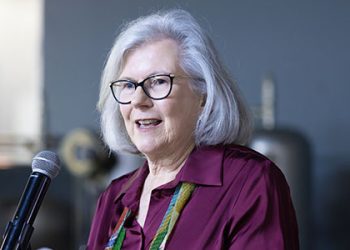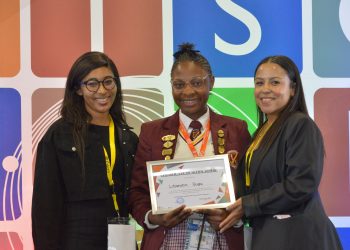Alex Rose-Innes
When Donna Strickland was awarded the Nobel Prize for Physics, the fact that she was the first woman to win this prestigious prize in more than half a century received more media scrutiny and publicity than her competence and breakthrough research.
At the time, Strickland said that she wished the headlines were different and that her gender did not have to be mentioned at all. Her remark opened a floodgate of female scientist tweets and LinkedIn posts and saw *Elodie Chabrol (see * at end of article), a science communication expert, raising the spotlight on challenges facing these high achievers, who still seem to be considered first and foremost as women than world-class scientists. Despite the huge strides made in creating a more equal world, the scientific and academic environment still seems to be rather old school in its thinking.

BLURB:
What if instead being seen as a woman first, Donna was simply described as an excellent scientist?
Dr Michelle Oyen, an Associate Biomedical Engineering Professor at the University of East Carolina in the United States (USA), said she hoped that she would someday not be part of a minority who had to wear a hard hat to be seen as a bio-engineer. She opined that all she wanted to be known as was as an engineer, with or without a hard hat as in STEM articles on women.
Dr Paola De Sessions, a former infectious disease researcher at The Genome Institute in Singapore and currently employed at Oxford Nanopore Technologies, said that most of the staff at the Institute were male and she did not consider it as a challenge but as an opportunity to push the envelope every day in order to be recognised.
Dr Liz MacDonald, Space weather scientist at NASA Goddard Space Flight Centre, USA, explained what science meant to her; “It means doing things that you never imagined like building instruments that fly in space and making contributions to understanding this complex world like the beautiful dances of the aurora borealis and helping others realize their dreams, because you can do it too and we need all perspectives to do better at solving problems!”
Dr Coline Jaworski, Postdoctoral Fellow working on bees, AXA Research Fund, France maintains that the biggest difference between males and females pursuing an academic career was that women could miss out on opportunities if they decide to have a child. It could put a stellar career on hold, making it difficult to compete in the highly demanding academic world.
Dr Francesca Fragkoudi, an astrophysicist working on galaxies, dynamics and dark matter at The Max Planck Institute for Astrophysics in Germany said she was grateful to all the pioneering women who made it possible for this generation to follow their scientific passion
Dr Miho Janvier, an astrophysicist and solar storm chaser at l’Institut d’Astrophysique Spatiale in France said; “To me, being a female scientist means exploring how to exist at the intersection of different identities. It pushes me to explore the conditions of identifying as female in the current society, the interplay with the work I do, how science has been done up to now and how I want the future of it to be. This constant reflection on gender is a call of awakening to fight against privileges and to make science more equal and more accessible to everyone.”

Dr Heather Berlin, neuroscientist and Professor of Psychiatry at Mount Sinai
Clinical Neuropsychology, Weill Cornell Medicine, USA, said she is a scientist who “just happens to be female.” She agreed that there were still many prejudices and obstacles in STEM to overcome, but hoped that she could lead by example in teaching young girls that anything boys can do, they can do just as well, if not better.
Dr Marta Olazaba, Head of Group on Climate Change Adaptation, AXA Research Fund, Spain said; “Scientist, woman, mum, citizen, daughter, sister…. All these roles make you a transformative person in society. The world needs to be understood from a woman’s point of view. Science and society also need women to build a more just and sustainable future for everyone and everything. Let’s empower new generations to keep doing what we started.”
The final word goes to Dr Meriame Berboucha, a laser physicist at the Imperial College in the United Kingdom; “As a woman in STEM and a woman of colour in STEM, I consider myself a minority in a minority, or minority squared if you will. But I won’t let that stop me from doing what I love. Science is global. It’s for everyone. Do what you love and that’s the most important part. Don’t let society put you in a box and guide you – let yourself go wherever your heart is content.”
*Elodie Chabrol is International Director of Point of Science. Her article had been published in Hindawi, publisher of scientific, technical and medical literature, annually publishing more than 230 peer-reviewed, scientific journals as well as a number of scholarly monographs, with an annual output of roughly 20,000 articles each year. The article by Alex Rose-Innes had been rewritten from information obtained under the Creative Commons Attribution License (CC-BY) of The Conversation.







